
parlant
LLM agents built for control. Designed for real-world use. Deployed in minutes.
Stars: 17742
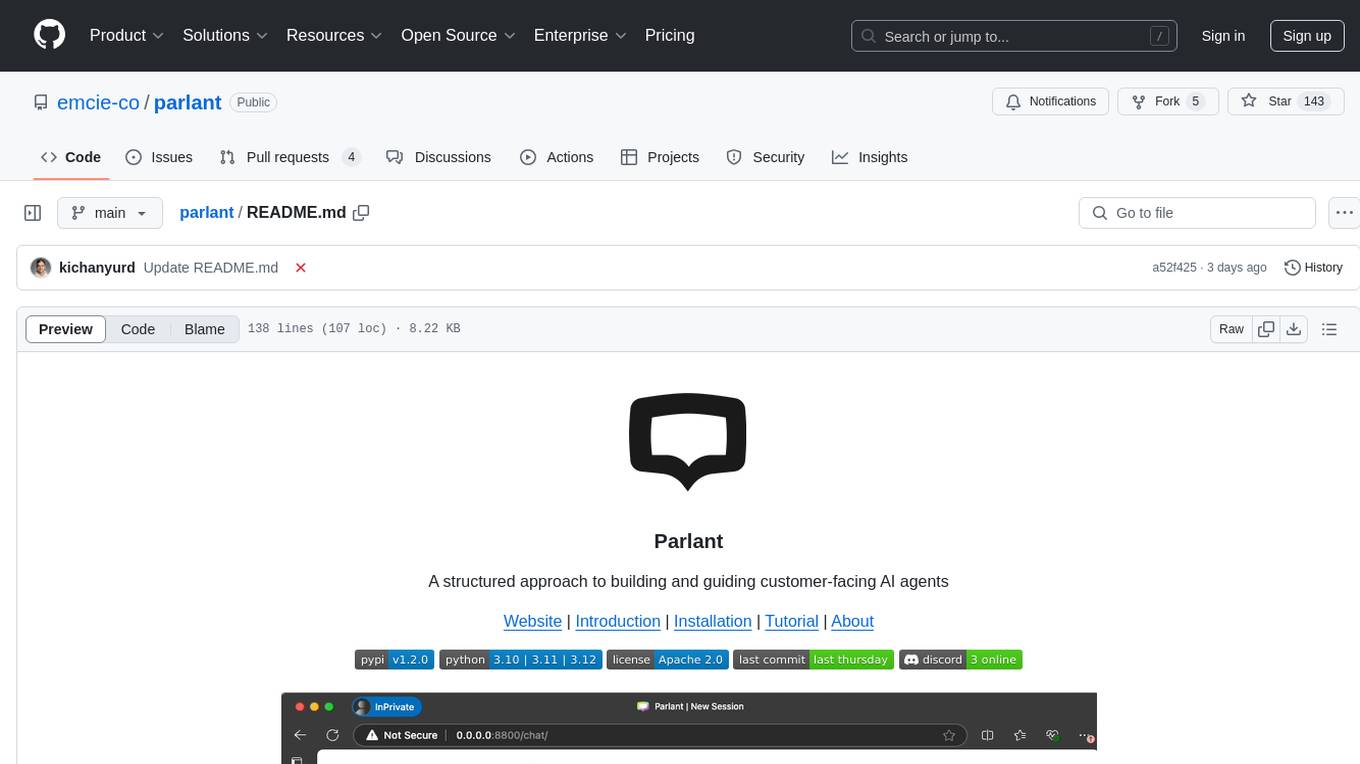
Parlant is a structured approach to building and guiding customer-facing AI agents. It allows developers to create and manage robust AI agents, providing specific feedback on agent behavior and helping understand user intentions better. With features like guidelines, glossary, coherence checks, dynamic context, and guided tool use, Parlant offers control over agent responses and behavior. Developer-friendly aspects include instant changes, Git integration, clean architecture, and type safety. It enables confident deployment with scalability, effective debugging, and validation before deployment. Parlant works with major LLM providers and offers client SDKs for Python and TypeScript. The tool facilitates natural customer interactions through asynchronous communication and provides a chat UI for testing new behaviors before deployment.
README:

🌐 Website • ⚡ Quick Start • 💬 Discord • 📖 Examples
Deutsch | Español | français | 日本語 | 한국어 | Português | Русский | 中文
You build an AI agent. It works great in testing. Then real users start talking to it and...
- ❌ It ignores your carefully crafted system prompts
- ❌ It hallucinates responses in critical moments
- ❌ It can't handle edge cases consistently
- ❌ Each conversation feels like a roll of the dice
Sound familiar? You're not alone. This is the #1 pain point for developers building production AI agents.
Parlant flips the script on AI agent development. Instead of hoping your LLM will follow instructions, Parlant ensures it.
# Traditional approach: Cross your fingers 🤞
system_prompt = "You are a helpful assistant. Please follow these 47 rules..."
# Parlant approach: Ensured compliance ✅
await agent.create_guideline(
condition="Customer asks about refunds",
action="Check order status first to see if eligible",
tools=[check_order_status],
)- ✅ Blog: How Parlant Ensures Agent Compliance
- 🆚 Blog: Parlant vs LangGraph
- 🆚 Blog: Parlant vs DSPy
- ⚙️ Blog: Inside Parlant's Guideline Matching Engine
Parlant gives you all the structure you need to build customer-facing agents that behave exactly as your business requires:
-
Journeys: Define clear customer journeys and how your agent should respond at each step.
-
Behavioral Guidelines: Easily craft agent behavior; Parlant will match the relevant elements contextually.
-
Tool Use: Attach external APIs, data fetchers, or backend services to specific interaction events.
-
Domain Adaptation: Teach your agent domain-specific terminology and craft personalized responses.
-
Canned Responses: Use response templates to eliminate hallucinations and guarantee style consistency.
-
Explainability: Understand why and when each guideline was matched and followed.
When your agent receives a message, Parlant's engine prepares a fully-aligned response before generating it:
%%{init: {'theme': 'base', 'themeVariables': {'primaryColor': '#e8f5e9', 'primaryTextColor': '#1b5e20', 'primaryBorderColor': '#81c784', 'lineColor': '#66bb6a', 'secondaryColor': '#fff9e1', 'tertiaryColor': '#F3F5F6'}}}%%
flowchart LR
A(User):::outputNode
subgraph Engine["Parlant Engine"]
direction LR
B["Match Guidelines and Resolve Journey States"]:::matchNode
C["Call Contextually-Associated Tools"]:::toolNode
D["Generated Message"]:::composeNode
E["Canned Message"]:::cannedNode
end
A a@-->|💬 User Input| B
B b@--> C
C c@-->|Fluid Output Mode?| D
C d@-->|Strict Output Mode?| E
D e@-->|💬 Fluid Output| A
E f@-->|💬 Canned Output| A
a@{animate: true}
b@{animate: true}
c@{animate: true}
d@{animate: true}
e@{animate: true}
f@{animate: true}
linkStyle 2 stroke-width:2px
linkStyle 4 stroke-width:2px
linkStyle 3 stroke-width:2px,stroke:#3949AB
linkStyle 5 stroke-width:2px,stroke:#3949AB
classDef composeNode fill:#F9E9CB,stroke:#AB8139,stroke-width:2px,color:#7E5E1A,stroke-width:0
classDef cannedNode fill:#DFE3F9,stroke:#3949AB,stroke-width:2px,color:#1a237e,stroke-width:0The guidelines and tools relevant to the current conversational state are carefully matched and enforced, keeping your agent focused and aligned, even with complex behavioral configurations.
pip install parlantimport parlant.sdk as p
@p.tool
async def get_weather(context: p.ToolContext, city: str) -> p.ToolResult:
# Your weather API logic here
return p.ToolResult(f"Sunny, 72°F in {city}")
@p.tool
async def get_datetime(context: p.ToolContext) -> p.ToolResult:
from datetime import datetime
return p.ToolResult(datetime.now())
async def main():
async with p.Server() as server:
agent = await server.create_agent(
name="WeatherBot",
description="Helpful weather assistant"
)
# Have the agent's context be updated on every response (though
# update interval is customizable) using a context variable.
await agent.create_variable(name="current-datetime", tool=get_datetime)
# Control and guide agent behavior with natural language
await agent.create_guideline(
condition="User asks about weather",
action="Get current weather and provide tips and suggestions",
tools=[get_weather]
)
# Add other (reliably enforced) behavioral modeling elements
# ...
# 🎉 Test playground ready at http://localhost:8800
# Integrate the official React widget into your app,
# or follow the tutorial to build your own frontend!
if __name__ == "__main__":
import asyncio
asyncio.run(main())That's it! Your agent is running with ensured rule-following behavior.
Validate agent behavior with the integrated testing & evaluation framework.
from parlant.testing import Suite, InteractionBuilder
from parlant.testing.steps import AgentMessage, CustomerMessage
suite = Suite(server_url="http://localhost:8800", agent_id="your_agent")
@suite.scenario
async def test_booking_flow():
async with suite.session() as session:
# Build conversation history
history = (
InteractionBuilder()
.step(CustomerMessage("Man it's cold today"))
.step(AgentMessage("Tell me about it, I'm freezing my nuts and bolts off."))
.step(CustomerMessage("Where are you from? I'm from Boston"))
.step(AgentMessage("What a dream! I'm stuck in a data center in San Fran..."))
.build()
)
# Preload session with event history
await session.add_events(history)
# Send customer message
response = await session.send("What's the temperature there today?")
# Assert on agent response using LLM-as-a-Judge
await response.should("provide weather details for San Francisco")Run with: parlant-test your_tests.py
|
|
| Financial Services | Healthcare | E-commerce | Legal Tech |
|---|---|---|---|
| Compliance-first design | HIPAA-ready agents | Customer service at scale | Precise legal guidance |
| Built-in risk management | Patient data protection | Order processing automation | Document review assistance |
- 🧭 Conversational Journeys - Lead the customer step-by-step to a goal
- 🎯 Dynamic Guideline Matching - Context-aware rule application
- 🔧 Reliable Tool Integration - APIs, databases, external services
- 📊 Conversation Analytics - Deep insights into agent behavior
- 🔄 Iterative Refinement - Continuously improve agent responses
- 🛡️ Built-in Guardrails - Prevent hallucination and off-topic responses
- 📱 React Widget - Drop-in chat UI for any web app
- 🔍 Full Explainability - Understand every decision your agent makes
Companies using Parlant:
Financial institutions • Healthcare providers • Legal firms • E-commerce platforms
"By far the most elegant conversational AI framework that I've come across! Developing with Parlant is pure joy." — Vishal Ahuja, Senior Lead, Customer-Facing Conversational AI @ JPMorgan Chase
| 🎯 I want to test it myself | → 5-minute quickstart |
| 🛠️ I want to see an example | → Healthcare agent example |
| 🚀 I want to get involved | → Join our Discord community |
- 💬 Discord Community - Get help from the team and community
- 📖 Documentation - Comprehensive guides and examples
- 🐛 GitHub Issues - Bug reports and feature requests
- 📧 Direct Support - Direct line to our engineering team
Apache 2.0 - Use it anywhere, including commercial projects.
Ready to build AI agents that actually work?
⭐ Star this repo • 🚀 Try Parlant now • 💬 Join Discord
Built with ❤️ by the team at Emcie
For Tasks:
Click tags to check more tools for each tasksFor Jobs:
Alternative AI tools for parlant
Similar Open Source Tools

parlant
Parlant is a structured approach to building and guiding customer-facing AI agents. It allows developers to create and manage robust AI agents, providing specific feedback on agent behavior and helping understand user intentions better. With features like guidelines, glossary, coherence checks, dynamic context, and guided tool use, Parlant offers control over agent responses and behavior. Developer-friendly aspects include instant changes, Git integration, clean architecture, and type safety. It enables confident deployment with scalability, effective debugging, and validation before deployment. Parlant works with major LLM providers and offers client SDKs for Python and TypeScript. The tool facilitates natural customer interactions through asynchronous communication and provides a chat UI for testing new behaviors before deployment.
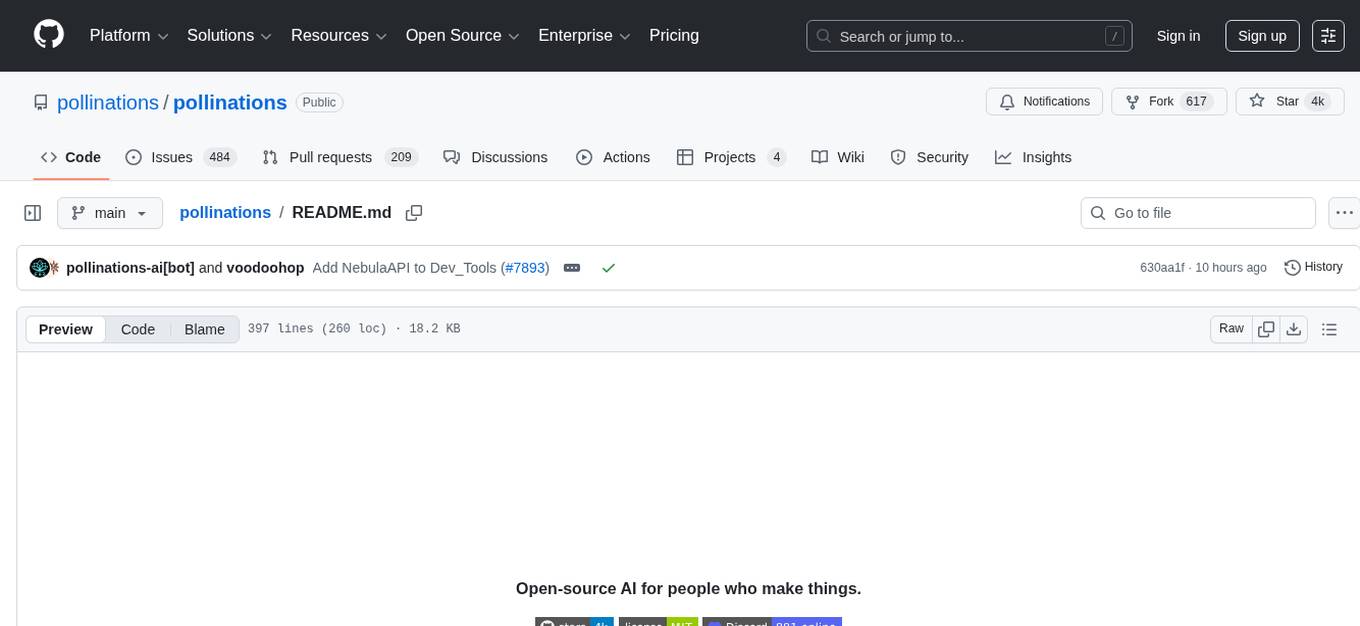
pollinations
pollinations.ai is an open-source generative AI platform based in Berlin, empowering community projects with accessible text, image, video, and audio generation APIs. It offers a unified API endpoint for various AI generation needs, including text, images, audio, and video. The platform provides features like image generation using models such as Flux, GPT Image, Seedream, and Kontext, video generation with Seedance and Veo, and audio generation with text-to-speech and speech-to-text capabilities. Users can access the platform through a web interface or API, and authentication is managed through API keys. The platform is community-driven, transparent, and ethical, aiming to make AI technology open, accessible, and interconnected while fostering innovation and responsible development.
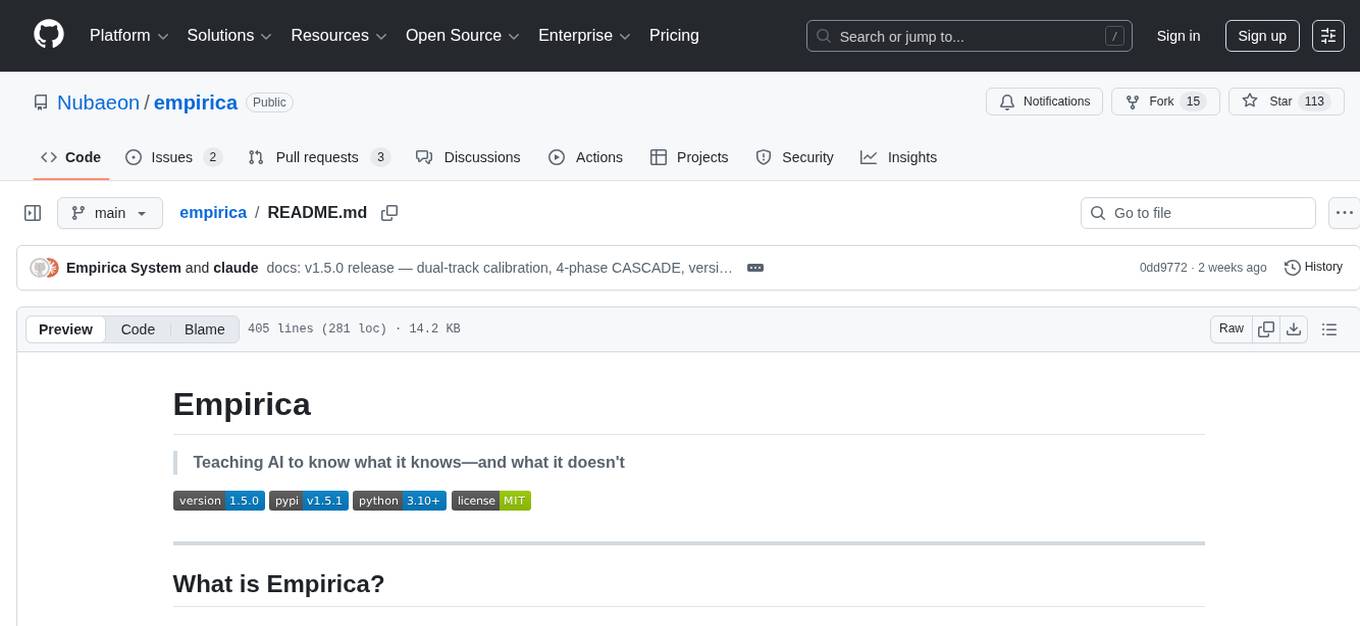
empirica
Empirica is an epistemic self-awareness framework for AI agents to understand their knowledge boundaries. It introduces epistemic vectors to measure knowledge state and uncertainty, enabling honest communication. The tool emerged from 600+ real working sessions across various AI systems, providing cognitive infrastructure for distinguishing between confident knowledge and guessing. Empirica's 13 foundational vectors cover engagement, domain knowledge depth, execution capability, information access, understanding clarity, coherence, signal-to-noise ratio, information richness, working state, progress rate, task completion level, work significance, and explicit doubt tracking. It is applicable across industries like software development, research, healthcare, legal, education, and finance, aiding in tasks such as code review, hypothesis testing, diagnostic confidence, case analysis, learning assessment, and risk assessment.
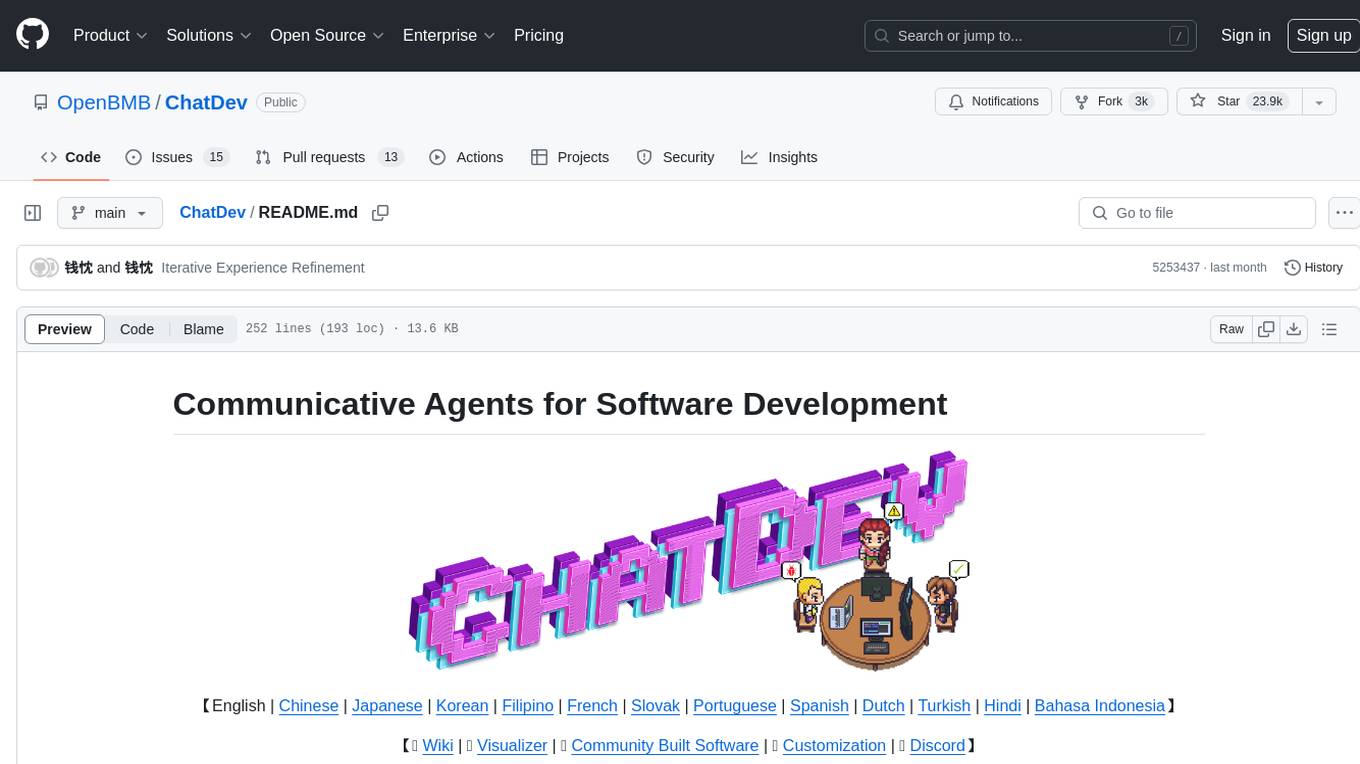
ChatDev
ChatDev is a virtual software company powered by intelligent agents like CEO, CPO, CTO, programmer, reviewer, tester, and art designer. These agents collaborate to revolutionize the digital world through programming. The platform offers an easy-to-use, highly customizable, and extendable framework based on large language models, ideal for studying collective intelligence. ChatDev introduces innovative methods like Iterative Experience Refinement and Experiential Co-Learning to enhance software development efficiency. It supports features like incremental development, Docker integration, Git mode, and Human-Agent-Interaction mode. Users can customize ChatChain, Phase, and Role settings, and share their software creations easily. The project is open-source under the Apache 2.0 License and utilizes data licensed under CC BY-NC 4.0.
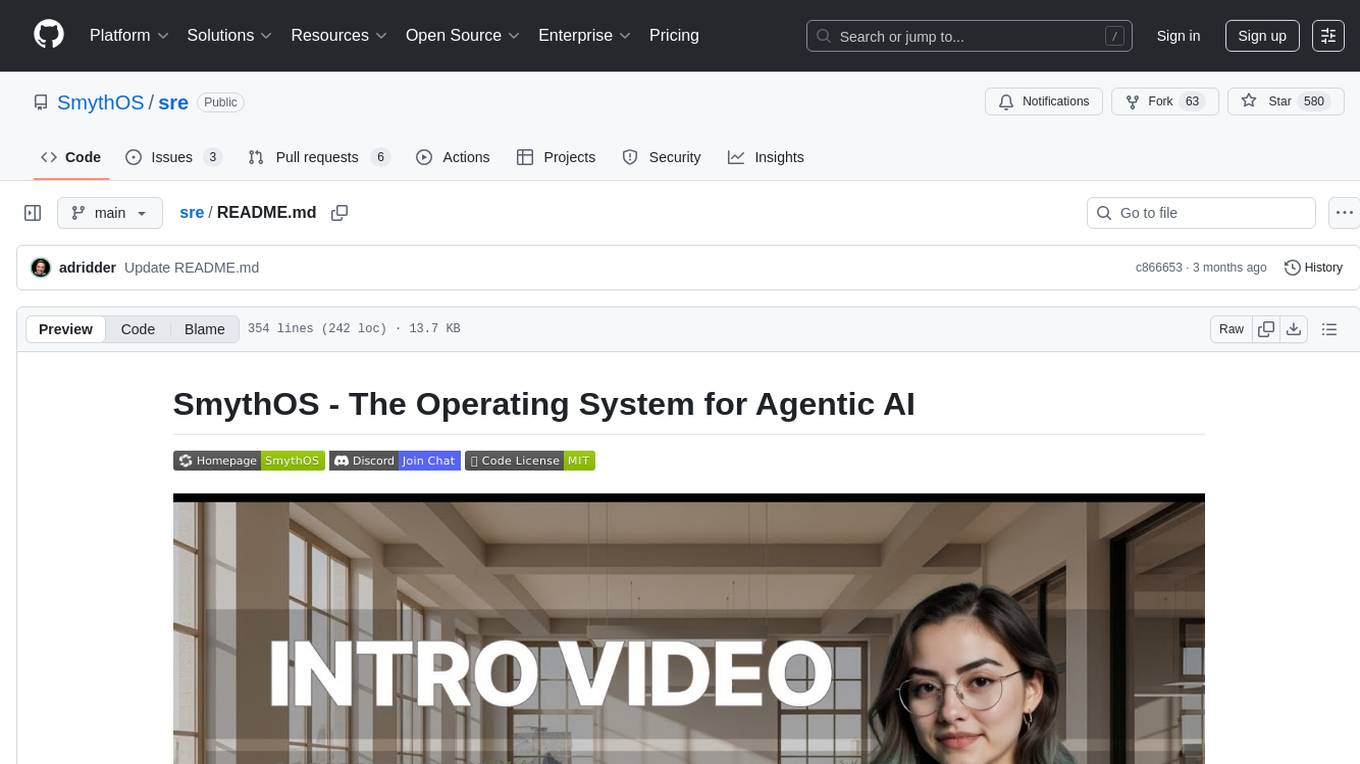
sre
SmythOS is an operating system designed for building, deploying, and managing intelligent AI agents at scale. It provides a unified SDK and resource abstraction layer for various AI services, making it easy to scale and flexible. With an agent-first design, developer-friendly SDK, modular architecture, and enterprise security features, SmythOS offers a robust foundation for AI workloads. The system is built with a philosophy inspired by traditional operating system kernels, ensuring autonomy, control, and security for AI agents. SmythOS aims to make shipping production-ready AI agents accessible and open for everyone in the coming Internet of Agents era.
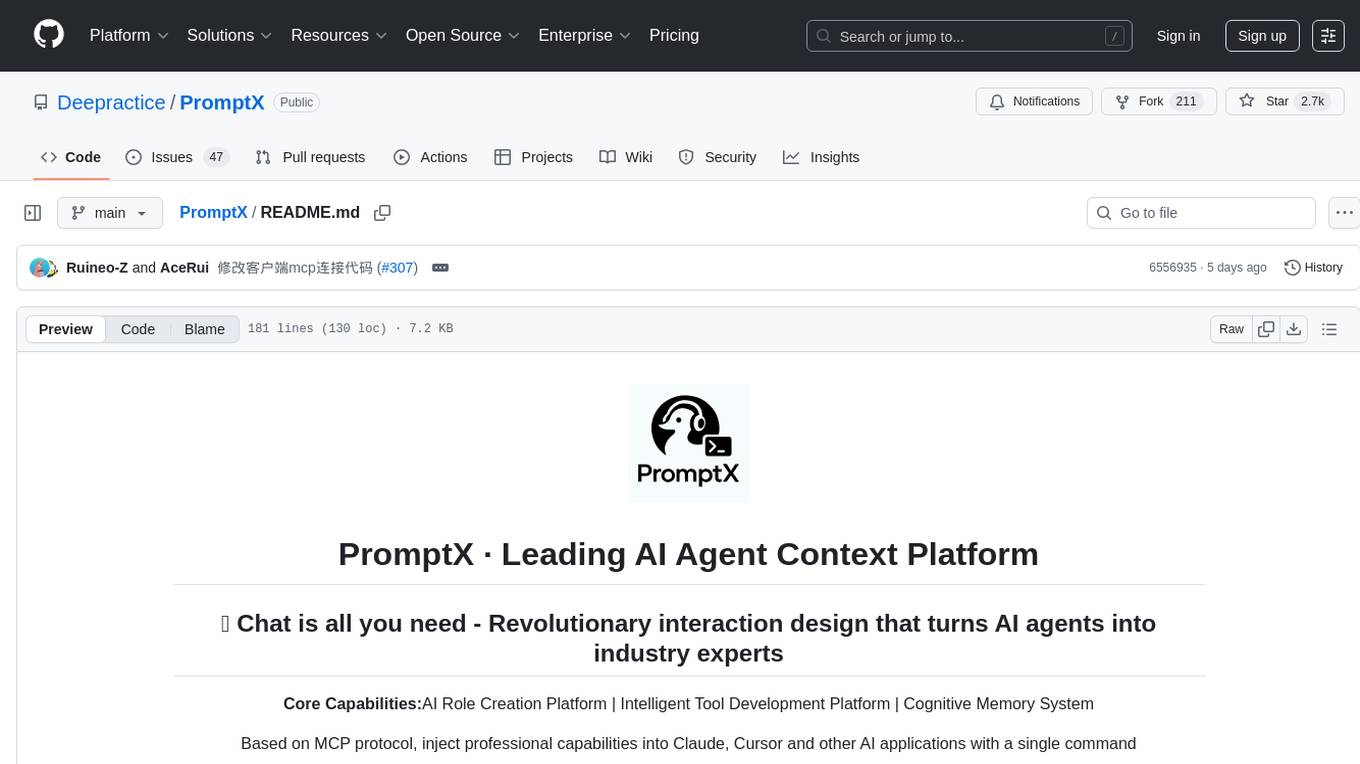
PromptX
PromptX is a leading AI agent context platform that revolutionizes interaction design, enabling AI agents to become industry experts. It offers core capabilities such as an AI role creation platform, intelligent tool development platform, and cognitive memory system. PromptX allows users to easily discover experts, summon them for assistance, and engage in professional dialogues through natural conversations. The platform's core philosophy emphasizes treating AI as a person, enabling users to communicate naturally without the need for complex commands. With Nuwa Creation Workshop, users can design custom AI roles using meta-prompt technology, transforming abstract needs into concrete executable AI expert roles in just minutes.
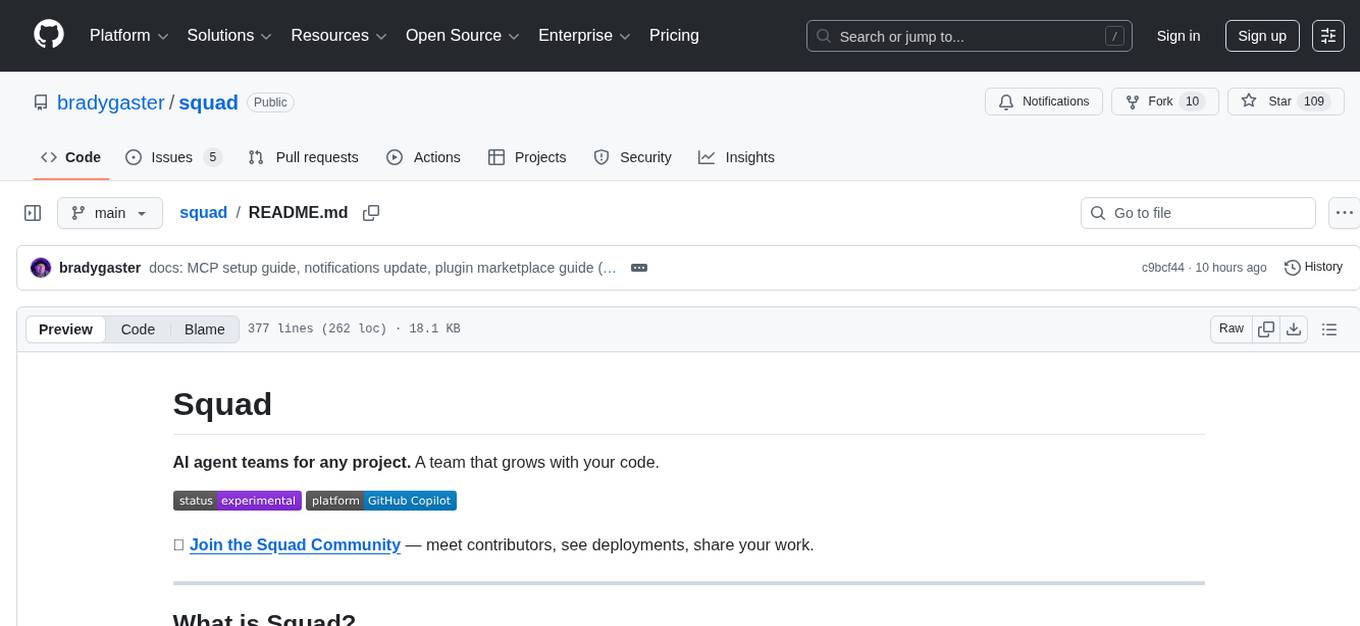
squad
Squad is an AI development tool that provides a team of specialists (frontend, backend, tester, lead) through GitHub Copilot. Each team member runs in its own context, learns your codebase, shares decisions, and improves over time. The tool works by launching agents in parallel to work on tasks simultaneously, with knowledge compounding across sessions. Squad stores team-wide decisions in `decisions.md` and individual agent learnings in `history.md`. The tool operates within a 200K token context window per agent, with optimizations to maximize actual work capacity. Squad's memory architecture includes `charter.md`, `history.md`, `decisions.md`, and `log/` for session history. The tool creates a `.ai-team/` folder with team roster, routing, decisions, and agent information, ensuring persistence and knowledge sharing. Squad allows for adding and removing team members, review protocols, and issue assignment and triage integration with GitHub Issues. It offers various features like client compatibility, VS Code support, project boards integration, label taxonomy, notifications, MCP setup guide, plugin marketplace, universe expansion, and more.
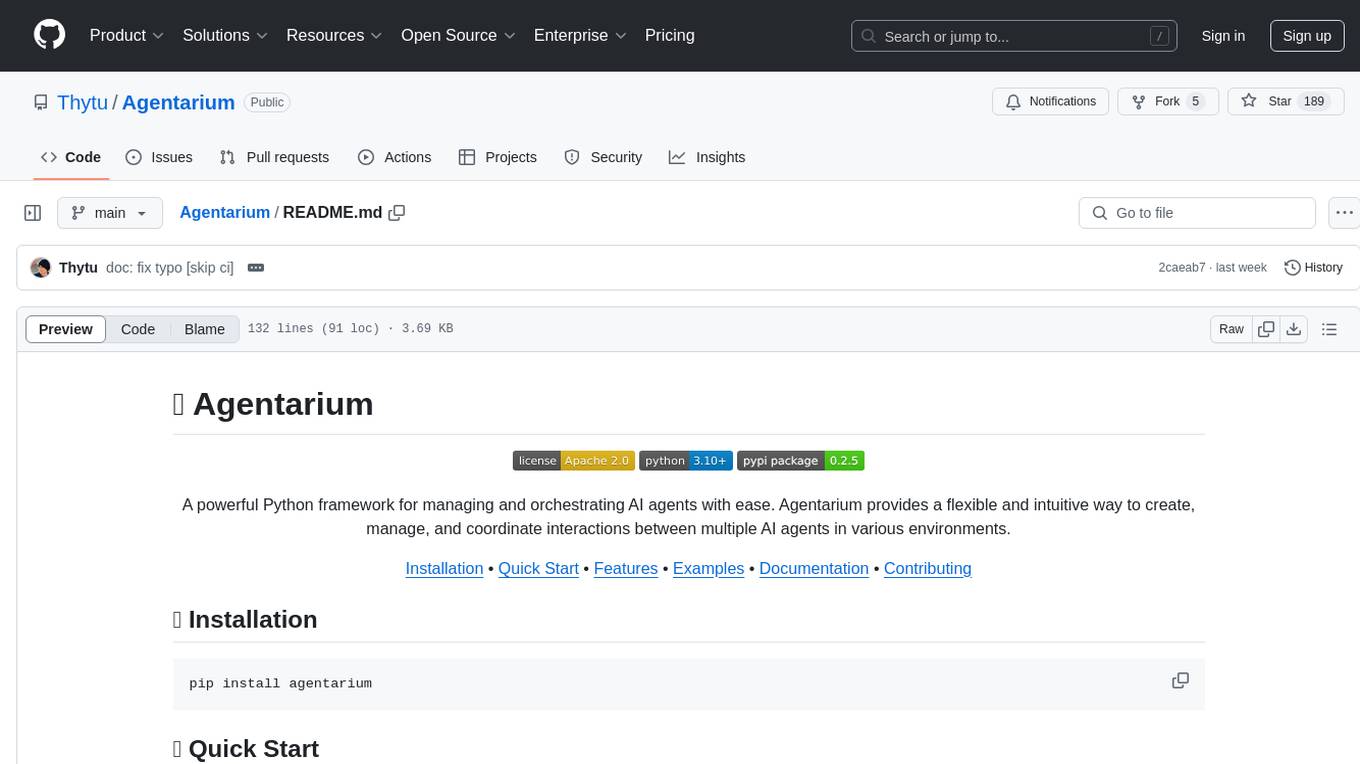
Agentarium
Agentarium is a powerful Python framework for managing and orchestrating AI agents with ease. It provides a flexible and intuitive way to create, manage, and coordinate interactions between multiple AI agents in various environments. The framework offers advanced agent management, robust interaction management, a checkpoint system for saving and restoring agent states, data generation through agent interactions, performance optimization, flexible environment configuration, and an extensible architecture for customization.
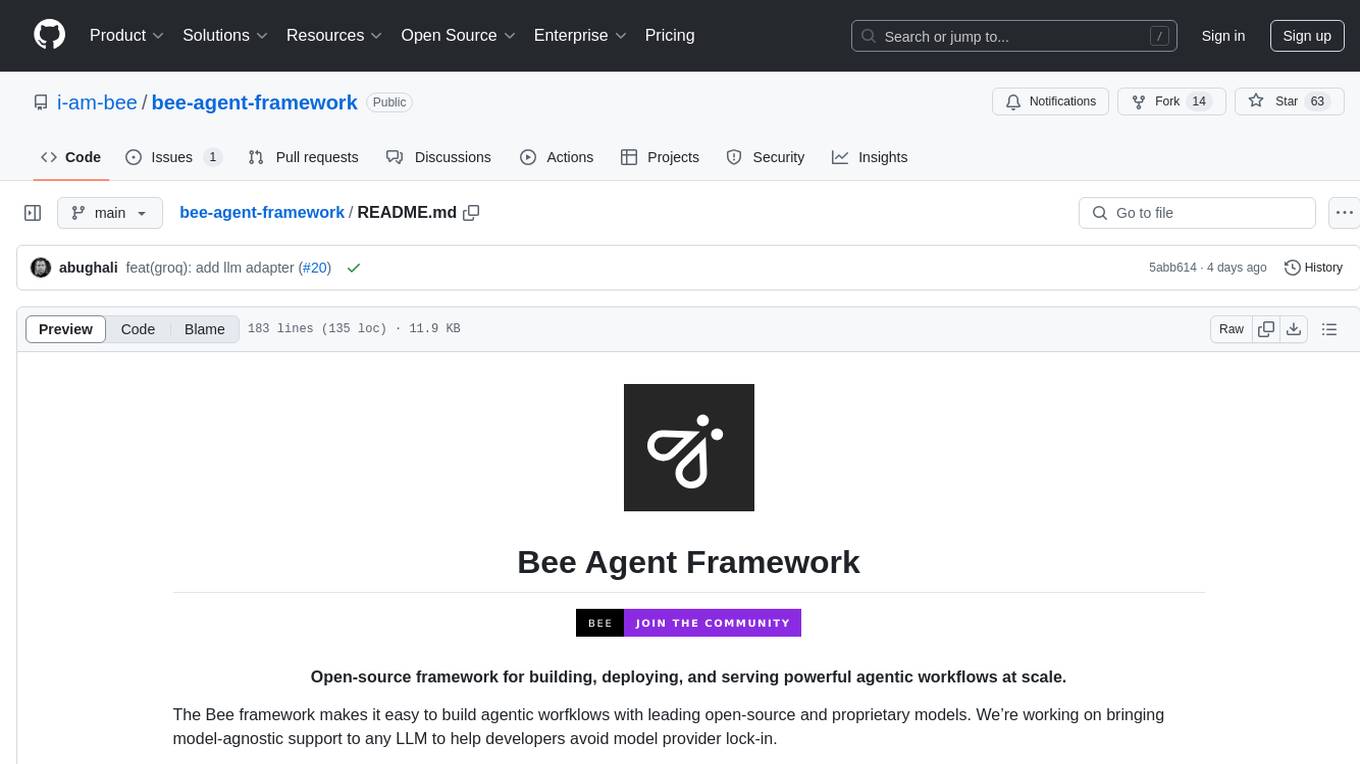
bee-agent-framework
The Bee Agent Framework is an open-source tool for building, deploying, and serving powerful agentic workflows at scale. It provides AI agents, tools for creating workflows in Javascript/Python, a code interpreter, memory optimization strategies, serialization for pausing/resuming workflows, traceability features, production-level control, and upcoming features like model-agnostic support and a chat UI. The framework offers various modules for agents, llms, memory, tools, caching, errors, adapters, logging, serialization, and more, with a roadmap including MLFlow integration, JSON support, structured outputs, chat client, base agent improvements, guardrails, and evaluation.
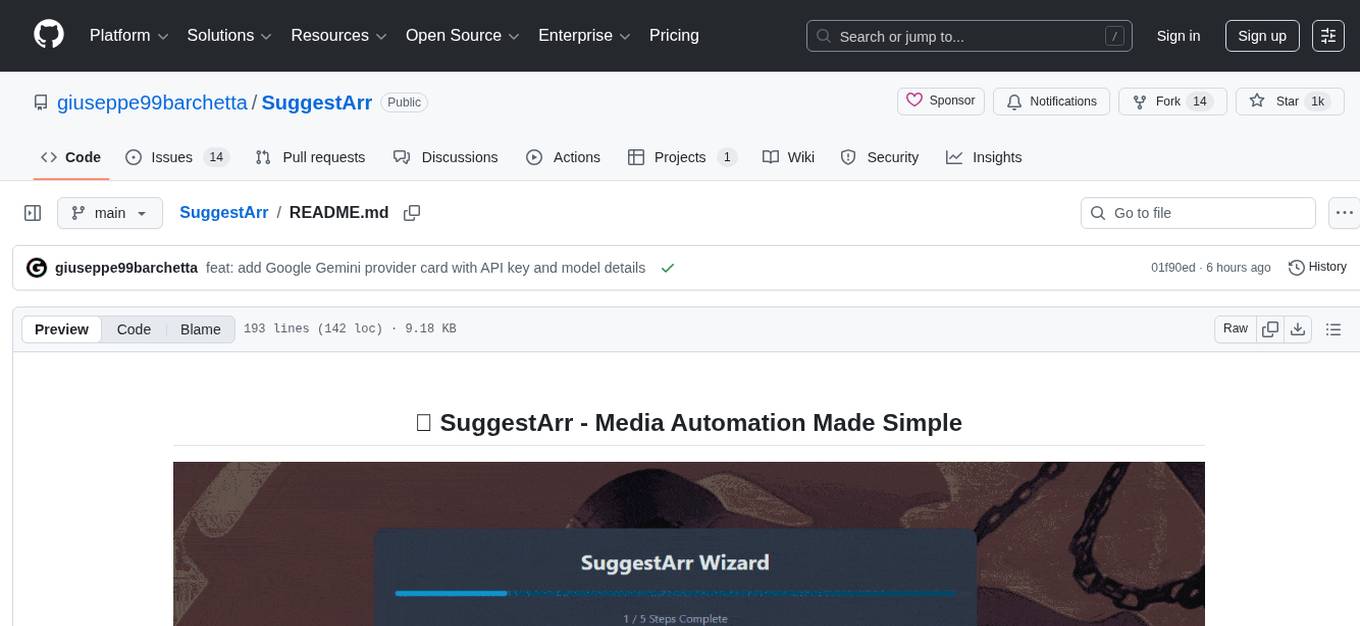
SuggestArr
SuggestArr is a Python library that provides functionality for generating suggestions based on input arrays. It allows users to easily create suggestions for various use cases such as autocomplete, search suggestions, and recommendation systems. The library uses algorithms like Levenshtein distance and cosine similarity to generate accurate and relevant suggestions. SuggestArr is designed to be flexible and customizable, allowing users to fine-tune the suggestion generation process to suit their specific needs.
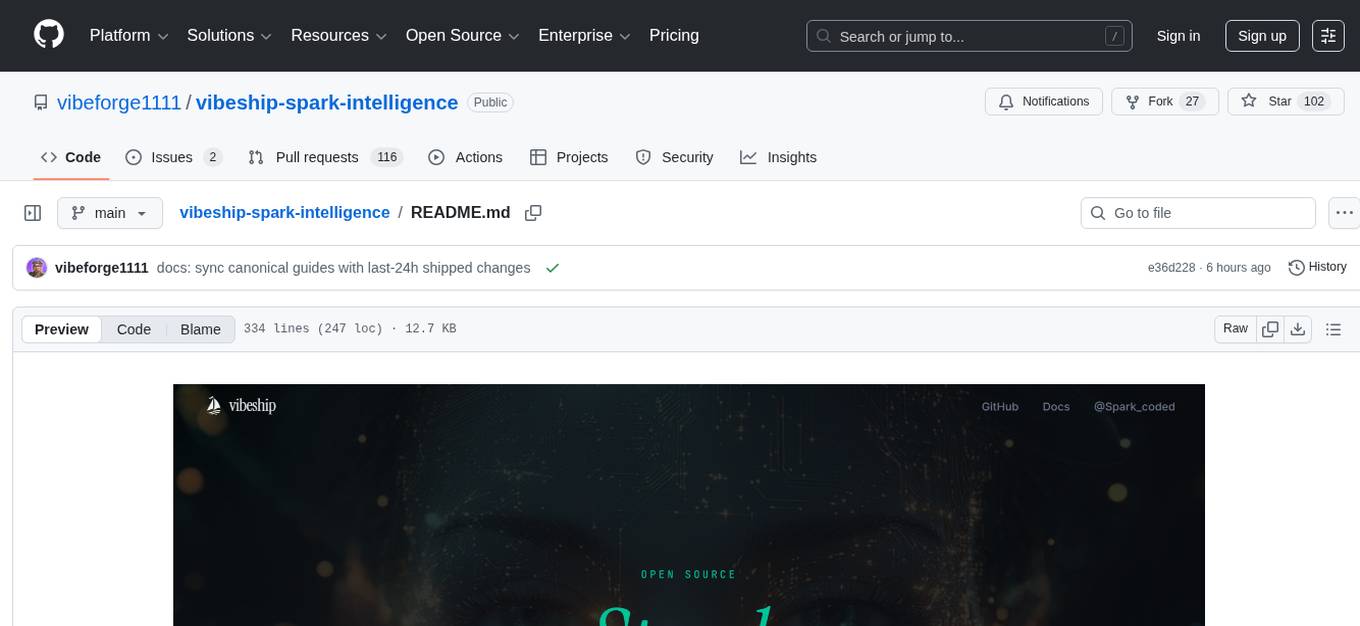
vibeship-spark-intelligence
Spark Intelligence is a self-evolving AI companion that runs 100% on your machine as a local AI companion. It captures, distills, transforms, and delivers advisory context to help you act with better context. It is designed to convert experience into adaptive operational behavior, not just stored memory. The tool is beyond a learning loop, continuously learning and growing smarter through use. It provides a distillation pipeline, transformation layer, advisory delivery, EIDOS loop, domain chips, observability surfaces, and a CLI for easy interaction. The architecture involves event capture, queue, bridge worker, pipeline, quality gate, cognitive learner, and more. The Obsidian Observatory integration allows users to browse, search, and query insights, decisions, and quality verdicts in a human-readable vault.
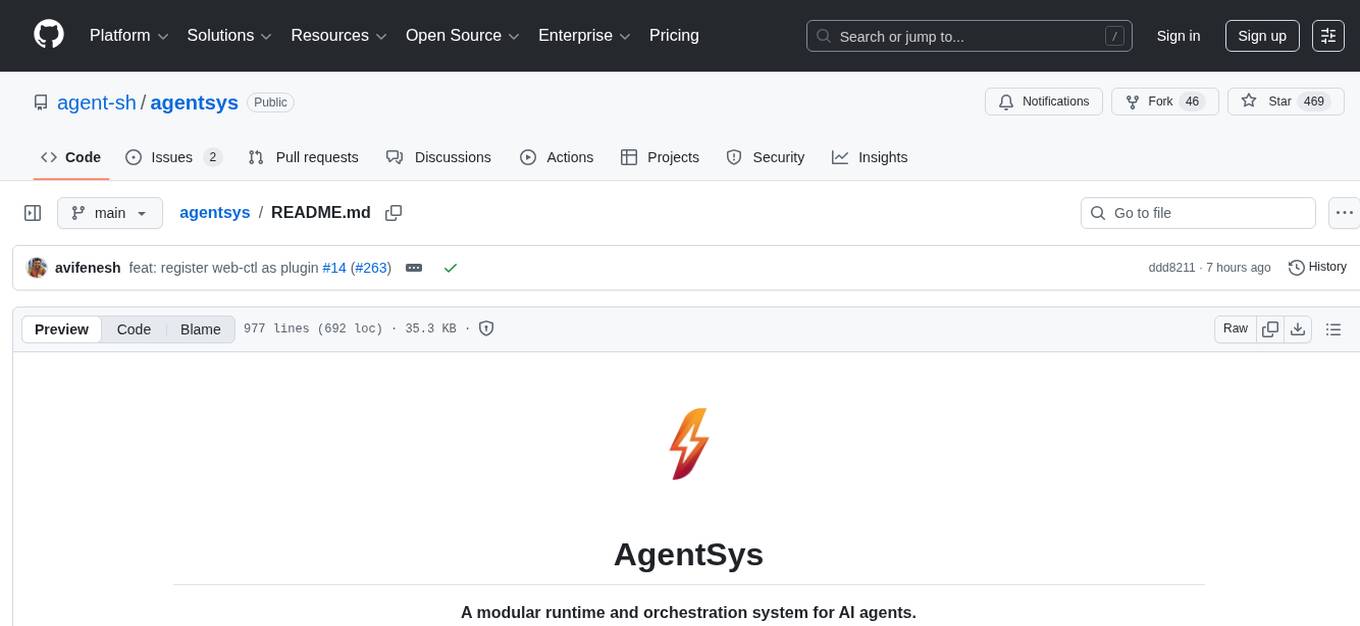
agentsys
AgentSys is a modular runtime and orchestration system for AI agents, with 14 plugins, 43 agents, and 30 skills that compose into structured pipelines for software development. Each agent has a single responsibility, a specific model assignment, and defined inputs/outputs. The system runs on Claude Code, OpenCode, and Codex CLI, and plugins are fetched automatically from their repos. AgentSys orchestrates agents to handle tasks like task selection, branch management, code review, artifact cleanup, CI, PR comments, and deployment.

GPTSwarm
GPTSwarm is a graph-based framework for LLM-based agents that enables the creation of LLM-based agents from graphs and facilitates the customized and automatic self-organization of agent swarms with self-improvement capabilities. The library includes components for domain-specific operations, graph-related functions, LLM backend selection, memory management, and optimization algorithms to enhance agent performance and swarm efficiency. Users can quickly run predefined swarms or utilize tools like the file analyzer. GPTSwarm supports local LM inference via LM Studio, allowing users to run with a local LLM model. The framework has been accepted by ICML2024 and offers advanced features for experimentation and customization.
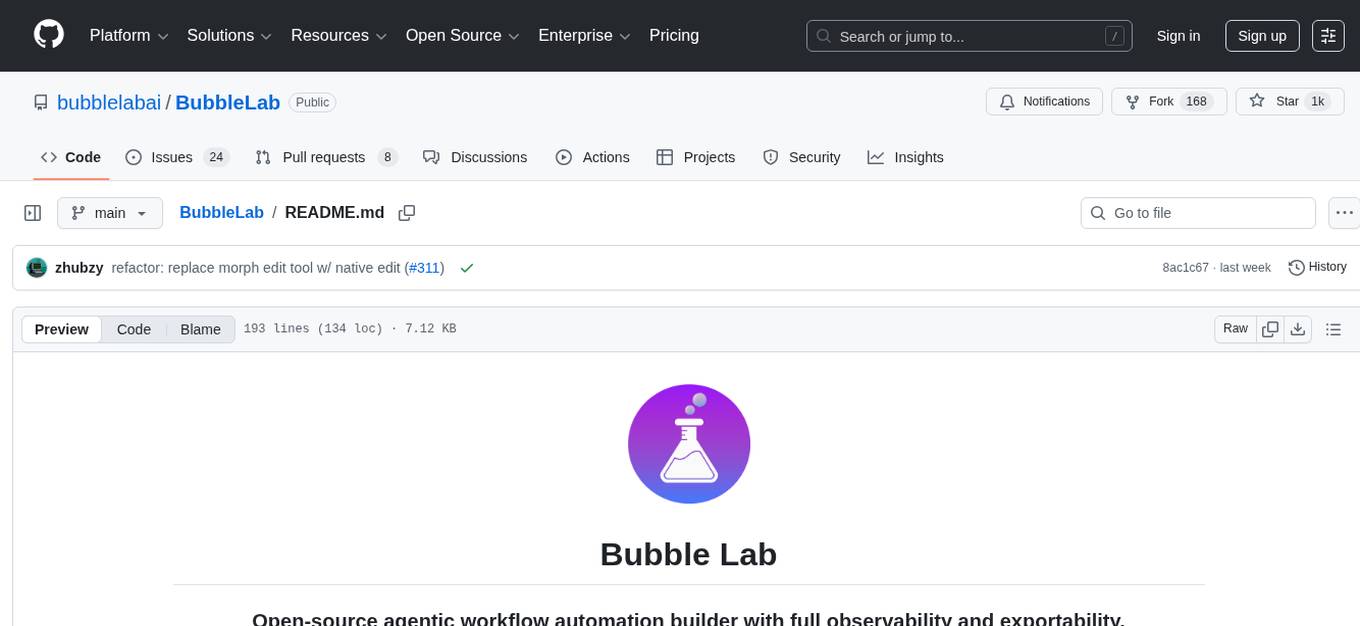
BubbleLab
Bubble Lab is an open-source agentic workflow automation builder designed for developers seeking full control, transparency, and type safety. It compiles workflows into clean, production-ready TypeScript code that can be debugged and deployed anywhere. With features like natural language prompt to workflow generation, full observability, seamless migration from other platforms, and instant export as TypeScript/API, Bubble Lab offers a flexible and code-centric approach to workflow automation.
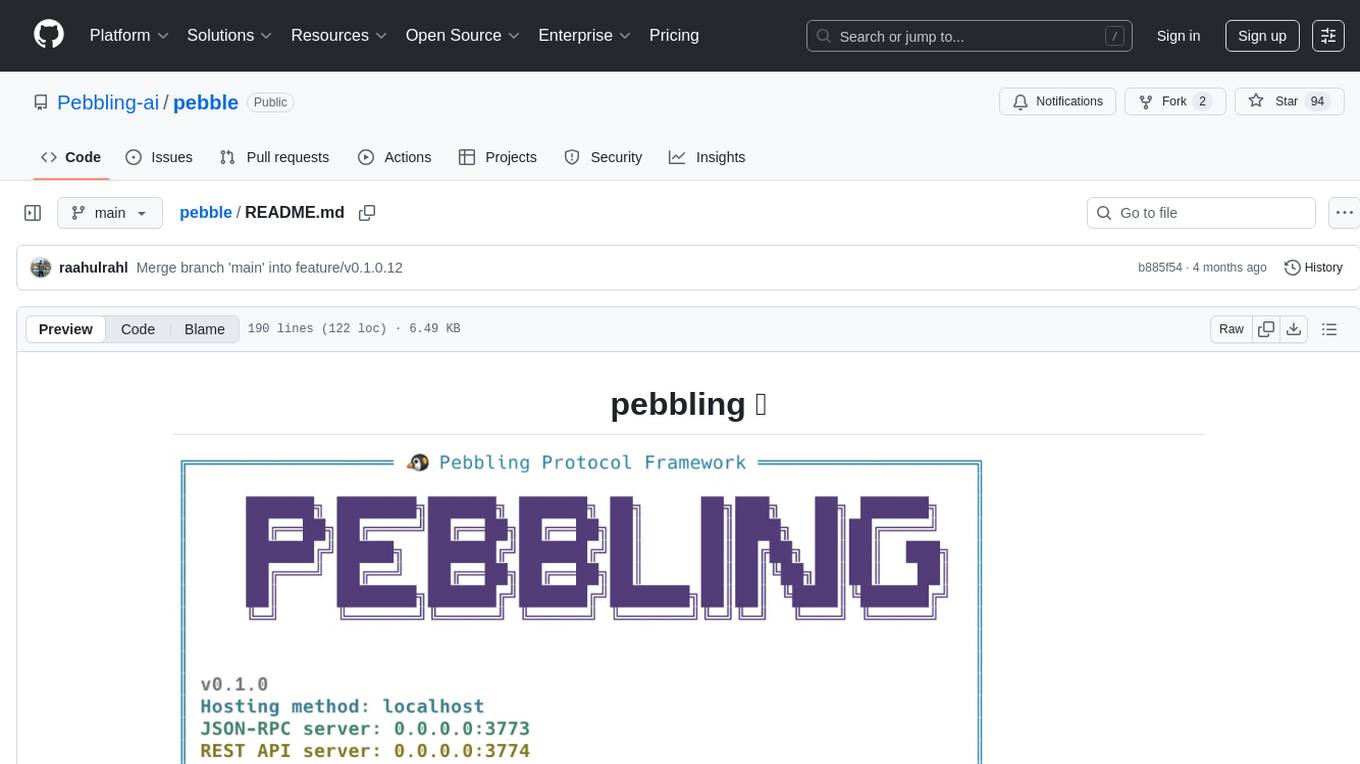
pebble
Pebbling is an open-source protocol for agent-to-agent communication, enabling AI agents to collaborate securely using Decentralised Identifiers (DIDs) and mutual TLS (mTLS). It provides a lightweight communication protocol built on JSON-RPC 2.0, ensuring reliable and secure conversations between agents. Pebbling allows agents to exchange messages safely, connect seamlessly regardless of programming language, and communicate quickly and efficiently. It is designed to pave the way for the next generation of collaborative AI systems, promoting secure and effortless communication between agents across different environments.
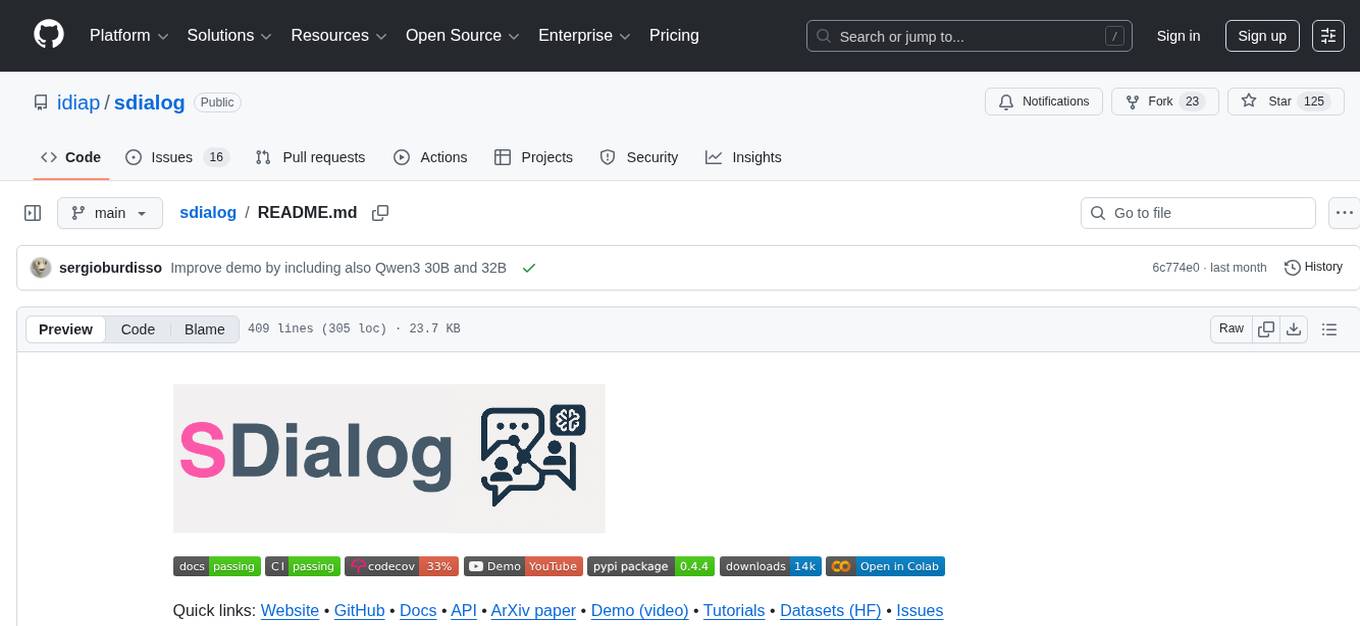
sdialog
SDialog is an MIT-licensed open-source toolkit for building, simulating, and evaluating LLM-based conversational agents end-to-end. It aims to bridge agent construction, user simulation, dialog generation, and evaluation in a single reproducible workflow, enabling the generation of reliable, controllable dialog systems or data at scale. The toolkit standardizes a Dialog schema, offers persona-driven multi-agent simulation with LLMs, provides composable orchestration for precise control over behavior and flow, includes built-in evaluation metrics, and offers mechanistic interpretability. It allows for easy creation of user-defined components and interoperability across various AI platforms.
For similar tasks
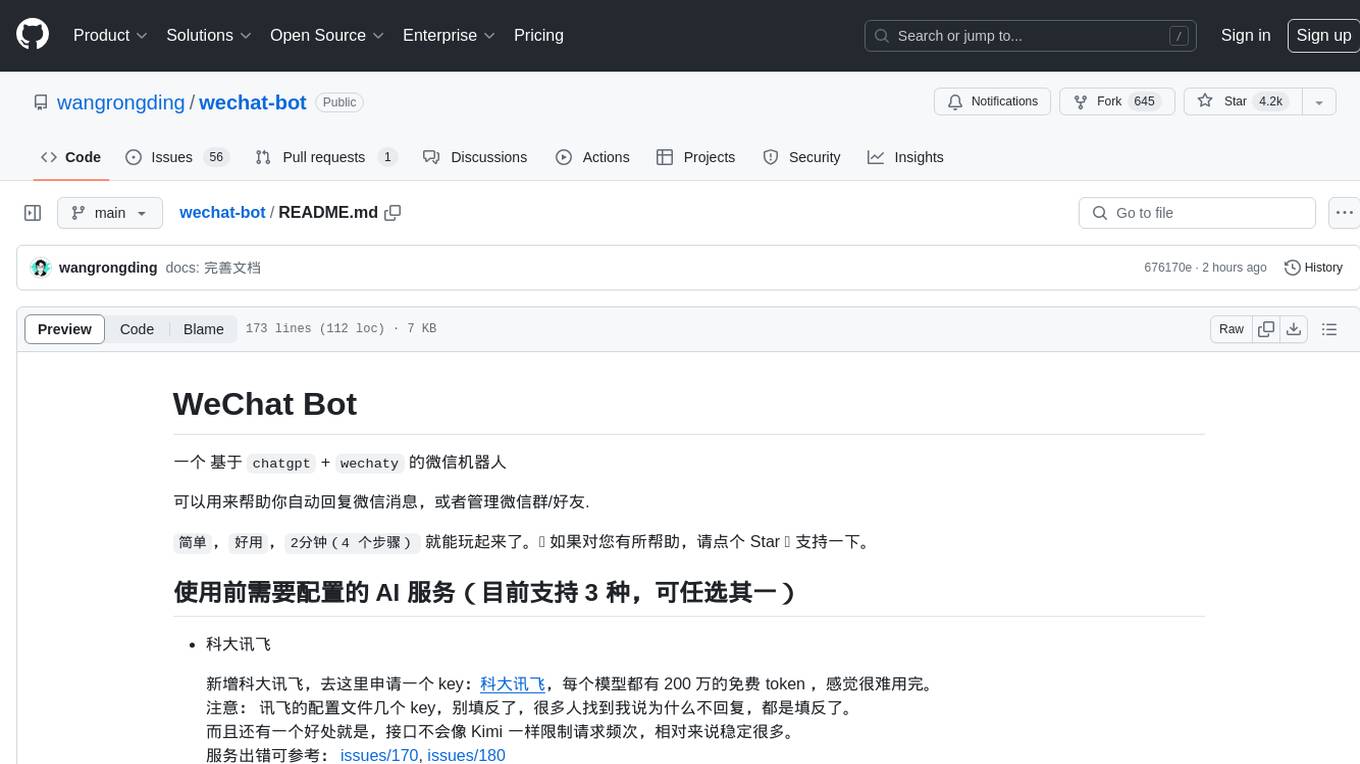
wechat-bot
WeChat Bot is a simple and easy-to-use WeChat robot based on chatgpt and wechaty. It can help you automatically reply to WeChat messages or manage WeChat groups/friends. The tool requires configuration of AI services such as Xunfei, Kimi, or ChatGPT. Users can customize the tool to automatically reply to group or private chat messages based on predefined conditions. The tool supports running in Docker for easy deployment and provides a convenient way to interact with various AI services for WeChat automation.
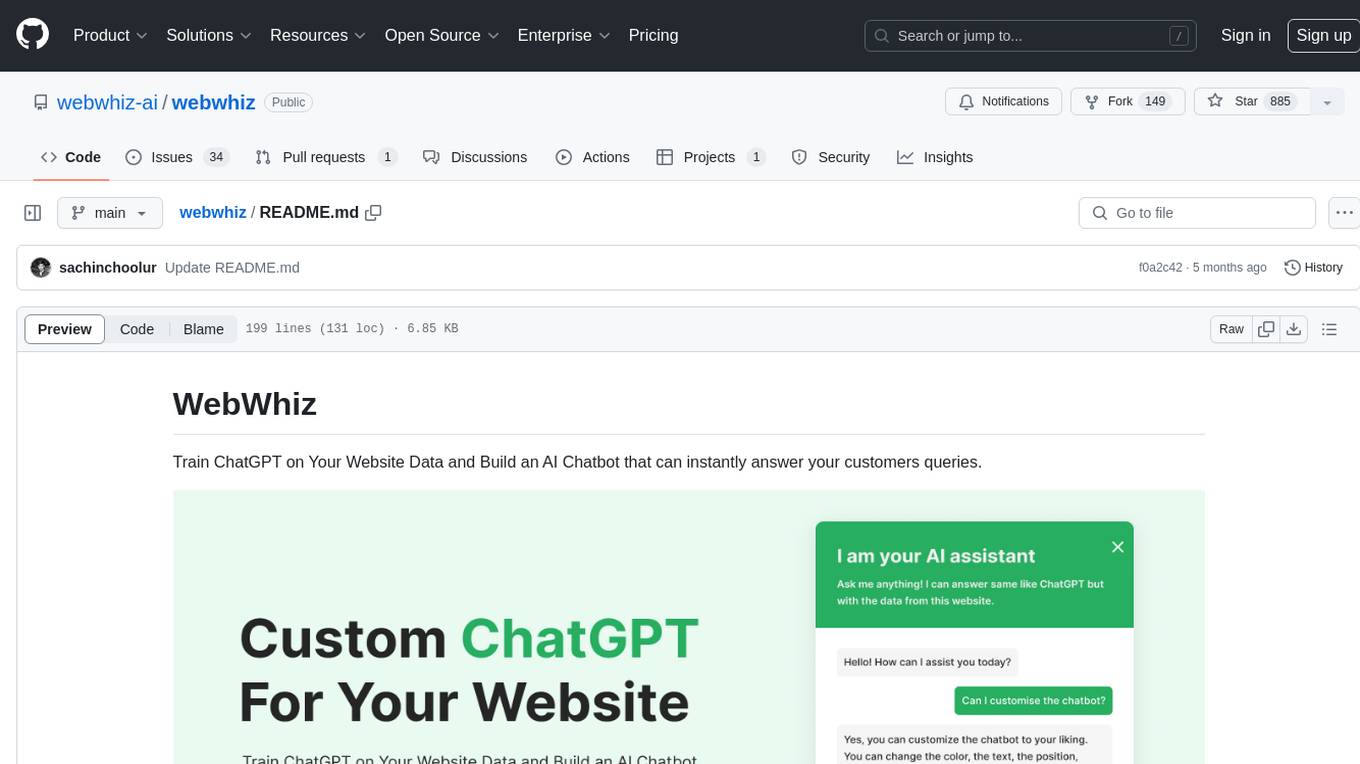
webwhiz
WebWhiz is an open-source tool that allows users to train ChatGPT on website data to build AI chatbots for customer queries. It offers easy integration, data-specific responses, regular data updates, no-code builder, chatbot customization, fine-tuning, and offline messaging. Users can create and train chatbots in a few simple steps by entering their website URL, automatically fetching and preparing training data, training ChatGPT, and embedding the chatbot on their website. WebWhiz can crawl websites monthly, collect text data and metadata, and process text data using tokens. Users can train custom data, but bringing custom open AI keys is not yet supported. The tool has no limitations on context size but may limit the number of pages based on the chosen plan. WebWhiz SDK is available on NPM, CDNs, and GitHub, and users can self-host it using Docker or manual setup involving MongoDB, Redis, Node, Python, and environment variables setup. For any issues, users can contact [email protected].

parlant
Parlant is a structured approach to building and guiding customer-facing AI agents. It allows developers to create and manage robust AI agents, providing specific feedback on agent behavior and helping understand user intentions better. With features like guidelines, glossary, coherence checks, dynamic context, and guided tool use, Parlant offers control over agent responses and behavior. Developer-friendly aspects include instant changes, Git integration, clean architecture, and type safety. It enables confident deployment with scalability, effective debugging, and validation before deployment. Parlant works with major LLM providers and offers client SDKs for Python and TypeScript. The tool facilitates natural customer interactions through asynchronous communication and provides a chat UI for testing new behaviors before deployment.
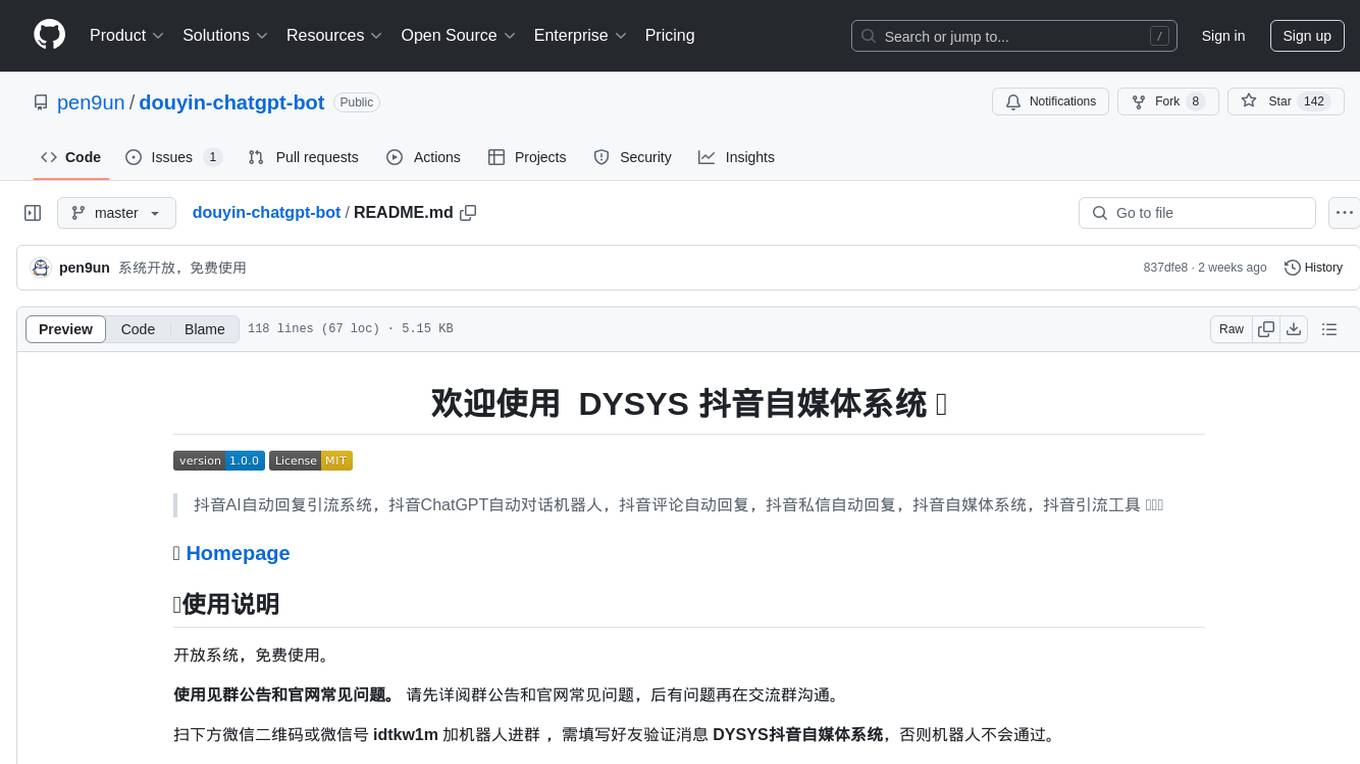
douyin-chatgpt-bot
Douyin ChatGPT Bot is an AI-driven system for automatic replies on Douyin, including comment and private message replies. It offers features such as comment filtering, customizable robot responses, and automated account management. The system aims to enhance user engagement and brand image on the Douyin platform, providing a seamless experience for managing interactions with followers and potential customers.
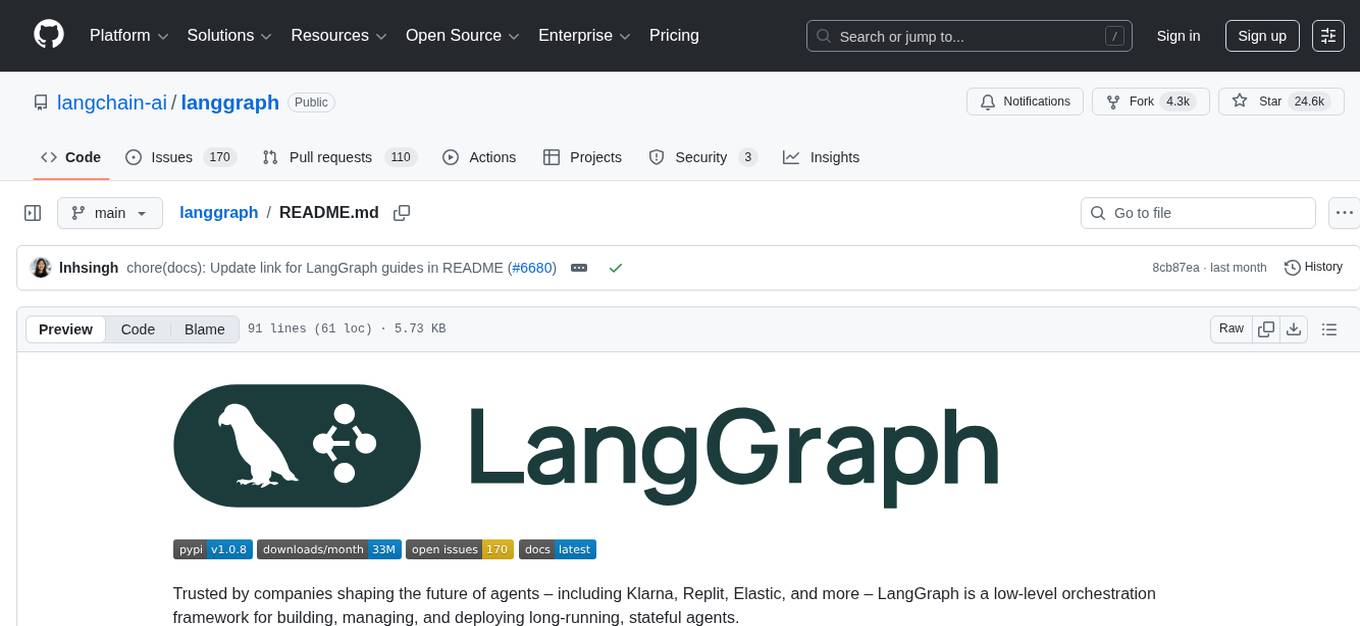
langgraph
LangGraph is a low-level orchestration framework for building, managing, and deploying long-running, stateful agents. It provides durable execution, human-in-the-loop capabilities, comprehensive memory management, debugging tools, and production-ready deployment infrastructure. LangGraph can be used standalone or integrated with other LangChain products to streamline LLM application development.
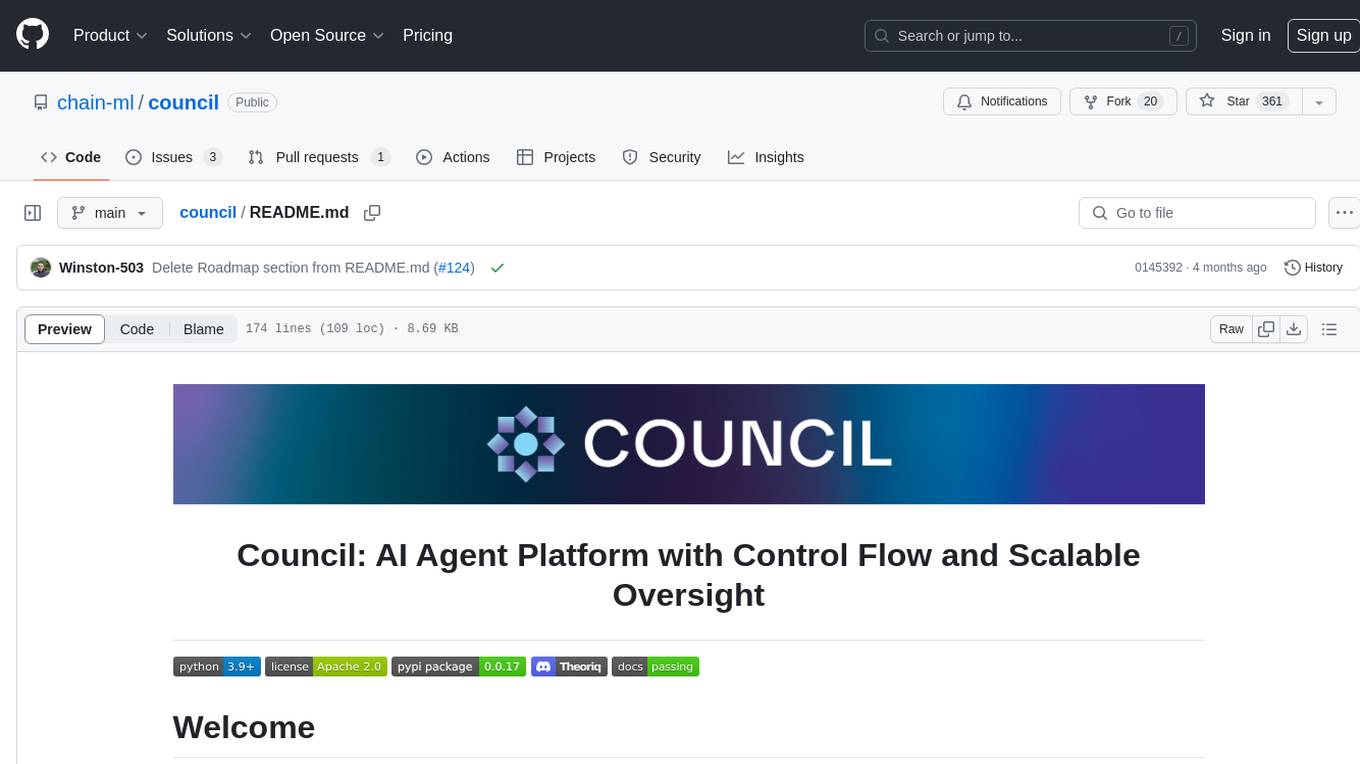
council
Council is an open-source platform designed for the rapid development and deployment of customized generative AI applications using teams of agents. It extends the LLM tool ecosystem by providing advanced control flow and scalable oversight for AI agents. Users can create sophisticated agents with predictable behavior by leveraging Council's powerful approach to control flow using Controllers, Filters, Evaluators, and Budgets. The framework allows for automated routing between agents, comparing, evaluating, and selecting the best results for a task. Council aims to facilitate packaging and deploying agents at scale on multiple platforms while enabling enterprise-grade monitoring and quality control.
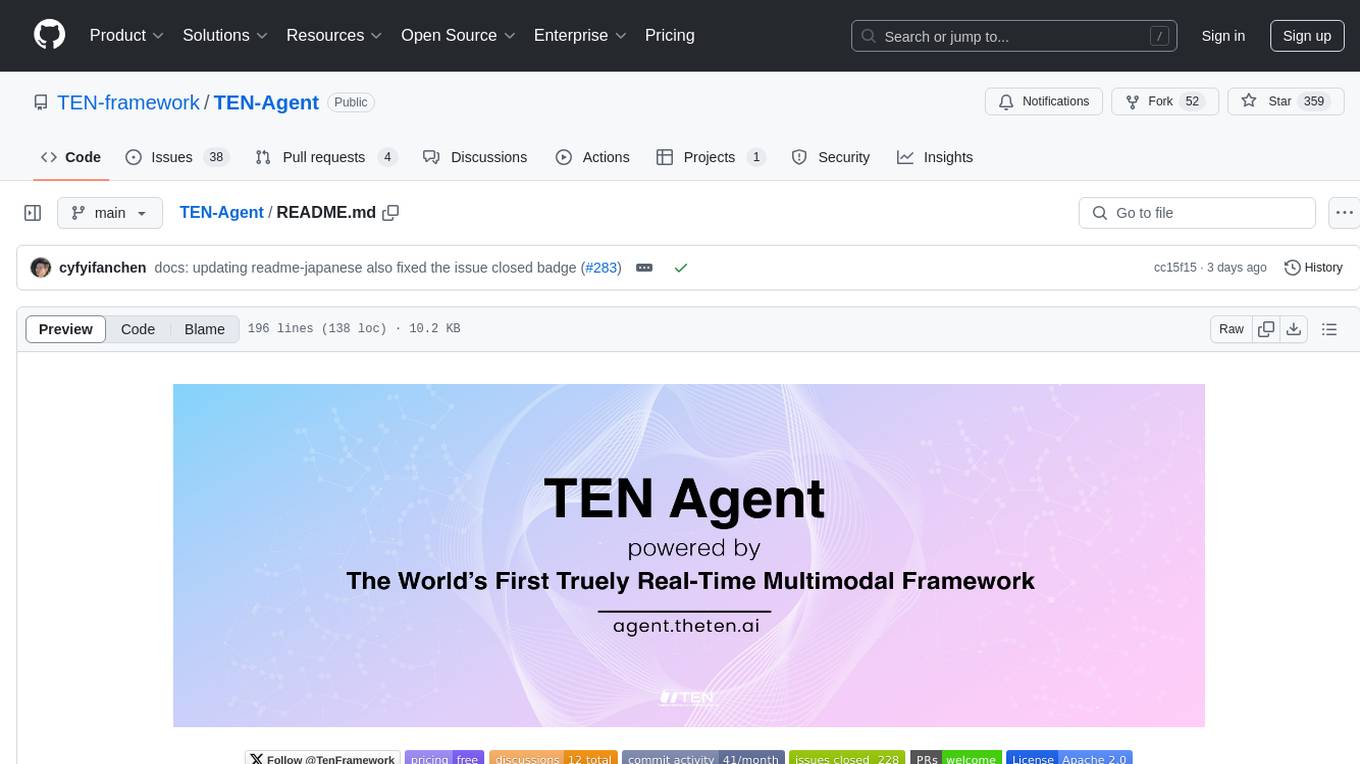
TEN-Agent
TEN Agent is an open-source multimodal agent powered by the world’s first real-time multimodal framework, TEN Framework. It offers high-performance real-time multimodal interactions, multi-language and multi-platform support, edge-cloud integration, flexibility beyond model limitations, and real-time agent state management. Users can easily build complex AI applications through drag-and-drop programming, integrating audio-visual tools, databases, RAG, and more.

AgentUp
AgentUp is an active development tool that provides a developer-first agent framework for creating AI agents with enterprise-grade infrastructure. It allows developers to define agents with configuration, ensuring consistent behavior across environments. The tool offers secure design, configuration-driven architecture, extensible ecosystem for customizations, agent-to-agent discovery, asynchronous task architecture, deterministic routing, and MCP support. It supports multiple agent types like reactive agents and iterative agents, making it suitable for chatbots, interactive applications, research tasks, and more. AgentUp is built by experienced engineers from top tech companies and is designed to make AI agents production-ready, secure, and reliable.
For similar jobs

sweep
Sweep is an AI junior developer that turns bugs and feature requests into code changes. It automatically handles developer experience improvements like adding type hints and improving test coverage.

teams-ai
The Teams AI Library is a software development kit (SDK) that helps developers create bots that can interact with Teams and Microsoft 365 applications. It is built on top of the Bot Framework SDK and simplifies the process of developing bots that interact with Teams' artificial intelligence capabilities. The SDK is available for JavaScript/TypeScript, .NET, and Python.

ai-guide
This guide is dedicated to Large Language Models (LLMs) that you can run on your home computer. It assumes your PC is a lower-end, non-gaming setup.

classifai
Supercharge WordPress Content Workflows and Engagement with Artificial Intelligence. Tap into leading cloud-based services like OpenAI, Microsoft Azure AI, Google Gemini and IBM Watson to augment your WordPress-powered websites. Publish content faster while improving SEO performance and increasing audience engagement. ClassifAI integrates Artificial Intelligence and Machine Learning technologies to lighten your workload and eliminate tedious tasks, giving you more time to create original content that matters.

chatbot-ui
Chatbot UI is an open-source AI chat app that allows users to create and deploy their own AI chatbots. It is easy to use and can be customized to fit any need. Chatbot UI is perfect for businesses, developers, and anyone who wants to create a chatbot.

BricksLLM
BricksLLM is a cloud native AI gateway written in Go. Currently, it provides native support for OpenAI, Anthropic, Azure OpenAI and vLLM. BricksLLM aims to provide enterprise level infrastructure that can power any LLM production use cases. Here are some use cases for BricksLLM: * Set LLM usage limits for users on different pricing tiers * Track LLM usage on a per user and per organization basis * Block or redact requests containing PIIs * Improve LLM reliability with failovers, retries and caching * Distribute API keys with rate limits and cost limits for internal development/production use cases * Distribute API keys with rate limits and cost limits for students

uAgents
uAgents is a Python library developed by Fetch.ai that allows for the creation of autonomous AI agents. These agents can perform various tasks on a schedule or take action on various events. uAgents are easy to create and manage, and they are connected to a fast-growing network of other uAgents. They are also secure, with cryptographically secured messages and wallets.

griptape
Griptape is a modular Python framework for building AI-powered applications that securely connect to your enterprise data and APIs. It offers developers the ability to maintain control and flexibility at every step. Griptape's core components include Structures (Agents, Pipelines, and Workflows), Tasks, Tools, Memory (Conversation Memory, Task Memory, and Meta Memory), Drivers (Prompt and Embedding Drivers, Vector Store Drivers, Image Generation Drivers, Image Query Drivers, SQL Drivers, Web Scraper Drivers, and Conversation Memory Drivers), Engines (Query Engines, Extraction Engines, Summary Engines, Image Generation Engines, and Image Query Engines), and additional components (Rulesets, Loaders, Artifacts, Chunkers, and Tokenizers). Griptape enables developers to create AI-powered applications with ease and efficiency.






